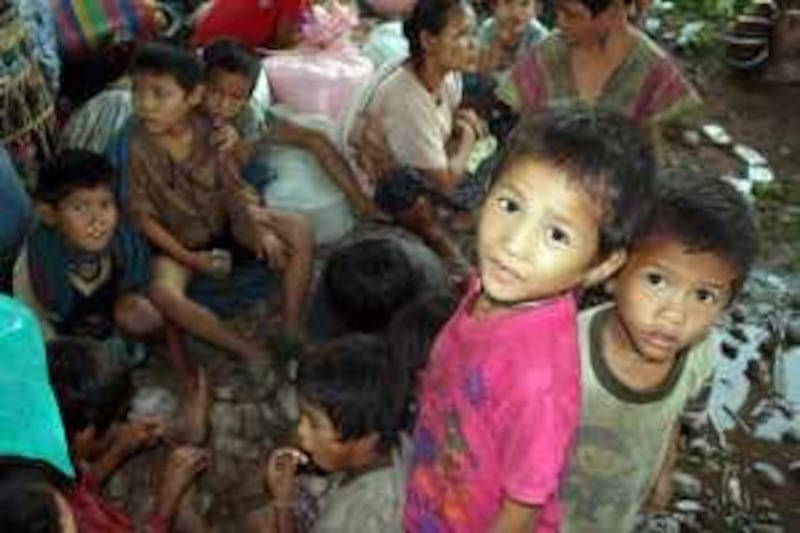MAE SOT, THAILAND // Thousands of ethnic Karen villagers have been forced to flee across the border into Thailand over the past few weeks as the Myanmar army steps up its assault on Karen rebels. Some of the recent refugees, mostly women and children, are crowded into the grounds of a temple, a couple of kilometres inside the Thai border, where they are healthy but lack access to basic necessities, aid workers said.
"They are in relatively good condition," said Kitty McKinsey, the regional spokeswoman for the United Nations High Commission for Refugees from Nuh Bo temple near the Thai border town of Mae Sot. "They are not emaciated, though many have walked for more than seven days to escape from the Myanmar army. "They hurriedly left with nothing but the clothes on their back." Many of the men stayed behind to look after the fields, aid workers said.
The Karen are one of many ethnic groups in Myanmar who have fought the junta for autonomy and independence. Most of the rebel groups have signed ceasefires, but not the Karen National Union. Their guerrilla force controlled a substantial part of Myanmar, then known as Burma, before independence in 1948. But since then the army has forced them back into the eastern part of the country, now known as Kayah or Karen state along the border with Thailand.
Over the past 20 years, military action and defections have whittled away at the KNU's strength. This recent assault started about two weeks ago when the army started bombing and shelling the border area and terrorising villagers with the help of a breakaway Karen faction, called the Democratic Karen Buddhist Army (DKBA). "These people were not just fleeing the fighting and the shelling. They are fleeing for fear of being forced to work as porters and of being conscripted into the army," Ms McKinsey said.
"The mere sight of a Burmese soldier fills me with fear and hatred," said 28-year-old Naw Dah, as she nursed her baby son in the grounds of the Nuh Bo temple. "They are heartless and we had to flee for our safety." More than 2,000 people have fled Myanmar in the past week, according to UN officials who interviewed the recent influx. But the number could be as high as 6,000, as many are in hiding inside Thailand, according to other aid agencies working in the area. What is certain is that the number is growing daily as the conflict escalates.
"If the fighting continues, at least 8,000 more villagers will have to escape across the border or die at the hands of the soldiers," said Zipporah Sein, the general secretary of the KNU. "Every day more people arrive looking for refuge from the fighting," said Pastor Robert Htway, who is chairman of the local Karen Refugee Council, which has provided assistance for Karen refugees in the area for more than 30 years.
The refugees are currently being cared for in five different sites, including Nuh Bo temple. The Thai authorities have set up medical centres to provide health care and medical checks. Several aid groups are providing assistance; the Thai Burma Border Consortium (TBBC) has been distributing rice, salt and fish paste, and the Karen Refugee Council giving out blankets and clothes. The most immediate priority is shelter, said Mr Htway, especially with the rainy season about to start in earnest. "What we need to do is construct a more permanent camp with proper buildings for the refugees to live in - rather than leave them in the makeshift tents," he said.
But the rain, which is already falling heavily every day, is making everything much more difficult, and sparking concern about outbreaks of disease such as diarrhoea and malaria. For the present, though, that seems to be all right, said Sally Thompson of the TBBC. "No outbreaks have been reported so far, only some cases of malaria." Most of the refugees are reluctant to be moved to camps in Thailand, preferring to be as close to the border as possible so they can return home when the fighting eases.
"They all say they want go back as soon as possible," Ms McKinsey said. "But to what; they all said their crops and livestock had been confiscated by the authorities. "They are clearly traumatised. They have lived with this kind of suffering all their lives." Noh Thay May, a 66-year-old grandmother, said: "I have been on the move since I was five years old. My days are numbered, and all I want is not to have to move again."
Many aid workers believe this is just the start of the exodus. Win Min, an analyst at Thailand's Chiang Mai University, believes this is the beginning a new protracted campaign against the Karen. "The rainy season may bring a temporary halt to this phase of the offensive, but there is certain to be a further assault on the KNU at the start of the new dry season," Win Min said. The signs are that this is going to be a long, drawn-out offensive.
ljagan@thenational.ae





